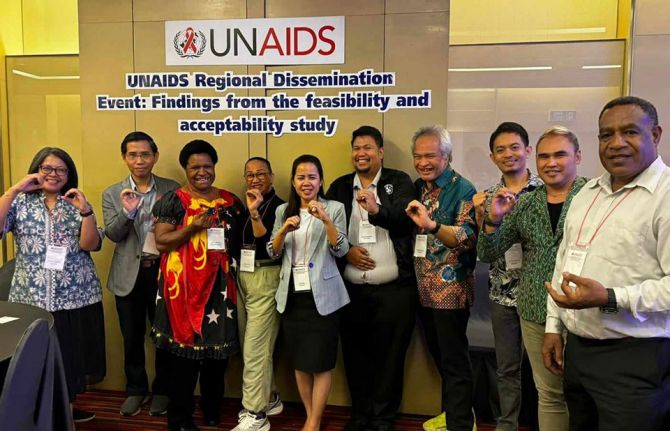

From 18-20 February, APTN brought together community delegates and experts from eleven countries for a regional community consultation on transgender issues to Bangkok, Thailand in partnership with the Being LGBT in Asia regional initiative and the Asia and the Pacific regional offices of UNDP, UNAIDS, UN Women, WHO and USAID. Credit: UNAIDS/H.Nhan

Natt Kraipet, Coordinator for the Asia Pacific Transgender Network (APTN). Credit: UNAIDS/H.Nhan
Feature Story
An agenda in transition: raising the profile of transgender and HIV issues in Asia and the Pacific
04 March 2014
04 March 2014 04 March 2014It only takes a minute with the new Coordinator for the Asia Pacific Transgender Network (APTN), Natt Kraipet to see her determination and drive for bringing issues of transgender rights and health to the forefront in the region.
“This is an important time for transgender people to be in the spotlight. We are too often invisible within societies and especially within health settings and yet we face significant rights and health challenges—including high risk of HIV infection,” said Ms Kraipet.
From 18-20 February, APTN brought together community delegates and experts from eleven countries for a regional community consultation on transgender issues to Bangkok, Thailand in partnership with the Being LGBT in Asia regional initiative and the Asia and the Pacific regional offices of UNDP, UNAIDS, UN Women, WHO and USAID.
Featuring participation from China, Hong Kong, India, Indonesia, Japan, Nepal, New Zealand, Philippines, Singapore, Thailand and Tonga, the consultation aimed to develop a set of steps and actions that APTN could take with partners, to address and prioritize specific human rights and health needs of transgender women and men.
“Much more evidence and knowledge is needed to be able to ensure services and programmes are reaching transgender people most effectively. That’s why we need to be included in public fora where we can highlight challenges and solutions,” Kraipet said.
Research and data on HIV risk and prevalence among transgender people is limited regionally, but some studies have found that transgender women are 50 times more likely to acquire HIV than adult males and females of reproductive age in the general population[1]. Examples of available national surveillance data in some countries in Asia and the Pacific indicate high HIV prevalence among transgender women in cities, for example: 30% in Jakarta, Indonesia, 23% in Port Moresby, Papua New Guinea, 18% in Maharashtra, India and over 10% in Bangkok, Chiang Mai and Phuket in Thailand.
However, focused programmes and initiatives for transgender people are largely lacking in national responses to HIV. And where they do exist, HIV prevention efforts are estimated to reach less than half of the transgender people who need the services.
Critical obstacles to progress
A central focus of the community consultation examined how health and social systems are often not adapted to the realities and needs of the community, particularly in resource-poor settings. Many transgender women and men report lack of technical knowledge among health personnel to advise or deal with transgender issues such as information on hormones, transition operations, psycho-social support, side-effects and if and how antiretroviral treatment can be combined with treatment linked to transgender transition.
“Absence of experts in health services in low-resource areas can lead transgender people ‘underground’ to undertake transition operations and hormone treatment within non-regulated settings—which in turn can lead to greater health complications and increase vulnerability to HIV,” said Steve Kraus, Director of UNAIDS Asia and the Pacific.
Issues such as lack of transgender-specific data, and punitive legal and policy environments were also highlighted as critical obstacles keeping transgender people from accessing health and HIV services.
Signs of success
A number of legal developments and programmes in Asia and the Pacific are showing encouraging signs of progress. In Bangladesh, Nepal and Pakistan several rulings have been made and/or legislation introduced which recognize transgender status for identification and paves the way for transgender people to access social and health rights. In Thailand, transgender identity is increasingly taken into consideration within work and education settings.
The strengthening of APTN and fellow organizations in the region also provides important opportunities. APTN’s efforts have been buoyed with new funding received from the Robert Carr Fund which was secured with support from UNAIDS Asia and the Pacific.
“We want APTN to be a real platform for transgender people; to be a concrete organization that promotes diversity and helps first at the community level,” Ms Kraipet explains. “I am determined that we will see important progress for transgender people and on HIV issues in our region over the next years,” she said.
[1] Winter, S. Lost in Transition: Transgender People, Rights and HIV Vulnerability in the Asia-Pacific Region. Bangkok: United Nations Development Programme and the Asia Pacific Transgender Network; 2012.



